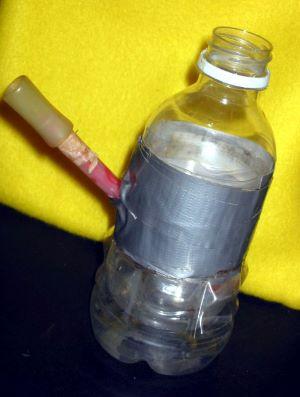What should have been a citation for drug paraphernalia gets turned into an outrageous attempt to lock a hapless drug user up for decades.

The American Civil Liberties Union (ACLU) of Minnesota has joined the defense of a Fargo, North Dakota, woman who faces up to 30 years and a $1 million fine in prison for the possession of bongwater with traces of methamphetamine in it. The absurd situation arose because a hardline Minnesota prosecutor took advantage of a longstanding loophole in state law allowing for such a cruel and usual prosecution.
The case is that of Jessica Beske, who was detained at a traffic stop in rural Polk County in May. Sheriff's deputies smelled marijuana and then searched her vehicle, finding drug paraphernalia and methamphetamine residue, as well as a glass bong that contained eight ounces of water with meth residue in it.
The legislature decriminalized the possession of drug paraphernalia last year, and Beske should have faced no more than a citation for possession of drug paraphernalia. But through an oversight, lawmakers neglected to address a 2009 state Supreme Court case, State vs. Peck, where a narrowly split court held that water in a bong could be considered a "drug mixture" for sentencing purposes. That decision came after testimony from a State Patrol officer who claimed bizarrely that dopers would keep bongwater "for future use… either drinking it or shooting it in the veins."
Three of the court's seven justices dissented. "Bongwater is usually discarded when the smoker is finished with consumption of the smoke filtered through the bong water," they wrote. "A person is not more dangerous, or likely to wreak more havoc, based on the amount of bong water that person possesses."
After the state became the subject of widespread ridicule with that decision, the legislature eventually passed a bill that said less than four ounces of bong water was exempt from the legal definition of a "drug mixture."
It is an arbitrary line.
"There doesn't seem to be any good reason why four ounces is ok, but five is not," said Kurtis Hanna, a longtime Minnesota drug reform advocate.
But because Beske's bongwater exceeded the four-ounce limit, Polk County Assistant Attorney Scott Buhler was able to consider it a "drug mixture" and treat the eight ounces of bongwater as if it were eight ounces of methamphetamine, charging Beske with a high-level felony with a decades-long sentence.
It is a practice that is not unknown but is still exceedingly rare among state prosecutors. When the Minnesota Reformer reached out to Robert Small, executive director of the Minnesota County Attorney's Association, he was incredulous that anyone was charging such cases.
"The legislative intent behind the weight-based thresholds is to approximate whether a person is an end user or a dealer," said Hanna. "The fact that some county prosecutors are subverting that clear intent and are charging end users as though they are wholesalers, ruining their lives in the process, is shameful."
But prosecutor Buhler is something of a special case. Not only is he charging Beske with felony drug possession, he has also charged her with violating the state's archaic illicit drug tax law, adding another seven years and a $14,000 fine to her possible sentence. And he added another charge for refusing a drug test at the time of her arrest.
In fact, Buhler gained statewide notoriety back in 2014 as one of the few prosecutors in the state who actually charged people under that drug tax statute.
"I simply charge it a lot because it leaves all options available regarding plea bargaining and sentencing," he told the Minneapolis Star Tribune at the time.
Now, the ACLU of Minnesota has stepped in. The group announced this month that it will represent Beske.
"We're pretty broadly interested in making sure Minnesotans aren't criminalized for things like addiction," said attorney Alicia Granse, who is working on the case. "Do we want to be spending so much of our resources on bong water?"
Granske also noted the drug tax charge and questioned whether such harsh charges really contribute to public safety.
"They're going hard up there," Granse said. "I don't know if that's what we really want to be spending our money on, or our time. "It sounds like this prosecutor is not willing to give up, but neither am I."
For Beske, the experience has been a nightmare. She said she used drugs to cope with an abusive relationship and now she lives with even more despair.
"The only thing I'm guilty of is using substances to lessen my mental suffering caused by a sick and abusive predator," she said. "Addicts -- women especially -- are made to feel like public enemy number one, when in fact most of us have been victims of serious crime that will never be prosecuted."
As for her prosecution and possible prison time: "It's just gonna make my life worse and make me want to use drugs more," she said. "That's why people use drugs mostly, is to cope."
The state legislature last year commissioned a drug policy report commissioned by the Legislature whose conclusion was that "arresting people for drug use does not deter future use, crime recidivism, arrest, or incarceration," and that "imprisonment does not impact rates of drug use or arrest."
Maybe someone should tell the good burghers of Polk County.
This work by StoptheDrugWar.org is licensed under Creative Commons Attribution-ShareAlike 4.0 International
Add new comment